|
| |
FEATURED
ARTIST
Welcome to a Links at RARWRITER
Featured
Artist page.
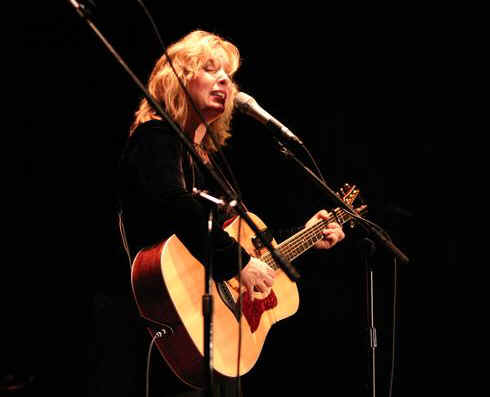
This
edition's spotlight is on Links friend GRETCHEN
PETERS, the Nashville songbird who has given us country classics in "Independence Day," which was a
Grammy-nominated hit for Martina McBride, "You Don't Even Know Who I
Am," a hit for Patty Loveless,
"Let That Pony Run" as recorded by Pam Tillis, Faith Hill’s
recording of "Secret of Life," and
"Chill of an Early Fall," a #1 for George Strait. The oeuvre
goes far beyond those highly recognized tunes to include such beautiful
introspections as "On A Bus to St. Cloud," recorded by Tricia Yearwood,
and the soundtrack for the animated feature Spirit, Stallion of the
Cimarron. Gretchen's lyric sheet to "Independence Day" hangs on a
wall in Nashville's Country Music Hall of Fame.
GRETCHEN
PETERS
by
RAR
When
RARWRITER.com launched a little less than a year ago, Gretchen Peters was one of
the big time players who leant to the site their names and even their material,
in the form of MP3 files for on line streaming. In that generosity, Gretchen and
others brought credibility to the site and RAR owes them all a debt of
gratitude. Mutual friends put me in touch with Gretchen last year. I had no
expectation that she would even remember me, let alone that she would assume the
risk of associating herself with the site. Our paths crossed in Boulder,
Colorado over 25 years ago, when she was a young songwriter getting airplay on
local station KBCO, and I was writing for a local entertainment publication. She
had won a songwriting competition and further examination of her song book had
revealed the depth and legitimacy of her talent. At a young age, she seemed like
someone destined to become someone. I wrote articles on Gretchen, but
knew her only slightly. I lost touch with her after leaving Boulder in 1983 and
it was years later that I learned that Gretchen Peters had penned country hits,
including some real classics. It was a nice discovery, evincing a kind of warm
reassurance that what you suspected was true yesterday is in fact true today as
well. Gretchen Peters was and is the real deal.
Gretchen is
currently touring a career retrospective show, "Wine, Women and Song,"
sharing a stage with Suzy Boggus and Matraca Berg to swap songs and
stories as only writers with histories can. That's where we started with our
interview.
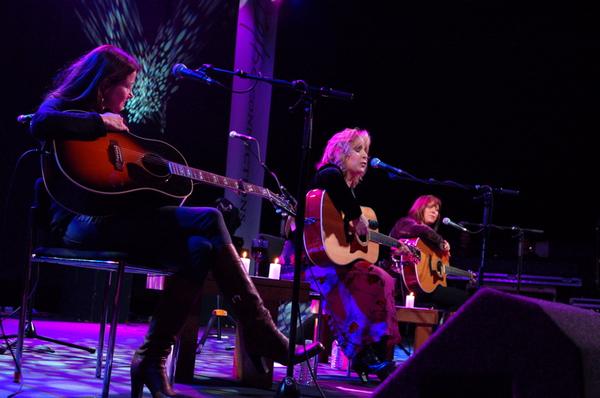
"WINE, WOMEN AND SONG" in
Glasgow, Scotland in January. From left, Matraca Berg, Gretchen Peters and
Suzy Bogguss
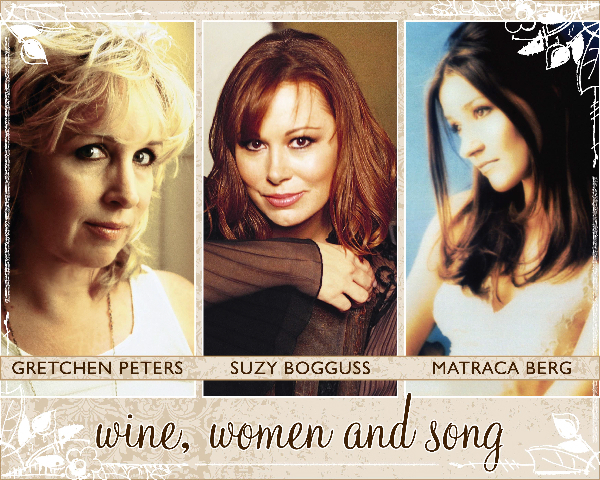
"WINE, WOMEN AND SONG"
composite group photo - three separate ways |
What has your preparation been like for
doing the "Wine, Women and Song" series? I'm sure the music is
the easy part, but how about the interaction segments. Have you scripted
the show in some way? And if so, what was your model for that?
There's absolutely no scripting to the show at all -
that's the beauty of it. The three of us are old friends and when we get on
stage together we have plenty to say. It's all off the cuff, and differs from
show to show. Our biggest problem is cutting down on the chatter so that we can
get enough songs in! The preparation was musical, mostly - we wanted to do a
"writers in the round" style of show, but with the music more worked
out - three part harmonies on lots of the songs. We wanted to sing together, and
it's much more fun when you've got your parts worked out and can relax and just
sing.
Did you bring in someone who has staged
these types of events? Is there a Producer? Is there a CD or DVD in the
works?
We "produced" the show ourselves, to the
extent that it's produced. We did put together some walk-in music - a sort of
tribute to all the great female singer-songwriters, everybody from Tammy Wynette
to Joni Mitchell to Carole King to Bobbie Gentry. And we went to the trouble to
create a stage set - nothing elaborate, but we wanted a living room feel, some
candles, some wine, anything to make it feel informal, comfortable and intimate.
We've been asked countless times about a CD or DVD. We'd love to do all of those
things, but our respective schedules and the logistics have made it impossible
so far. We couldn't even get a group photo shoot scheduled, so we had to come up
with a composite image (left). It's just really hard with the three of us going three
separate ways; we're all really busy and constantly traveling. We keep talking
about it though.
|
Do you feel comfortable and enjoy the
"conversational" format? Or do you find yourself wanting to
get to the next song right away? How do you pace such a show?
I love the conversation. I think all three of us
do. You know, once you do enough of these kinds of shows you learn to read the
audience and you just know when it's time to move on to the next song, when it's
time to bring a little levity to the situation, when it's time to do a real
heart-wrencher. You just feel it. All three of us are very comfortable playing
off of each other, and I think we all three have a comfort level with each
other's sense of professionalism, which is great - I always know that the other
two will keep me on the rails, and vice versa.
|
One might think that having three
songwriters together on stage could engender some competitive or
protective urge to do songs that would stand up well alongside
those of the others, possibly even give you an edge. Comparisons come
with the territory, don't they? Have the three of you selected songs
that ensure that the show works in some equally supportive way?
One thing we're doing is specifically selecting
songs that lend themselves to three part harmony. We were really focused on that
from the start. I think we all were influenced by the Linda Ronstadt/Dolly
Parton/Emmylou Harris "Trio" albums, and we just couldn't wait to sink
our teeth into that kind of harmony. It's really something that we all love to
do, but in our solo incarnations don't get to do that often. I know that when
I've gotten together after hours with Matraca and Jeff Hanna (Matraca's husband
and founding member of the Nitty Gritty Dirt Band) we've had the most fun just
singing old songs that we knew, singing harmony together. It's how we all got
hooked on music to begin with, and it's pure joy.
We also made sure to set aside one song for each
of us that is sort of a wild card slot - that is to say, it's a song that's done
completely solo, without the other two, which means that we each get a little
solo section where we can do whatever we are moved to do that night. The set
list is very fluid, it changes every night according to the audience and us and
the mood. It allows for lots of spontaneity.
There is a friendly competitiveness in writers'
nights, or guitar pulls, or whatever you want to call them. It's a good thing,
usually; it's a bit of a prod to get you to bring your best game. But at this
stage of the game we're all beyond any kind of competitiveness that comes from
fear, or insecurity, I think. I mean, we've all been doing this for awhile, and
we've each got a pretty good sense of ourselves. And, truly, we're all big fans
of each other.
|
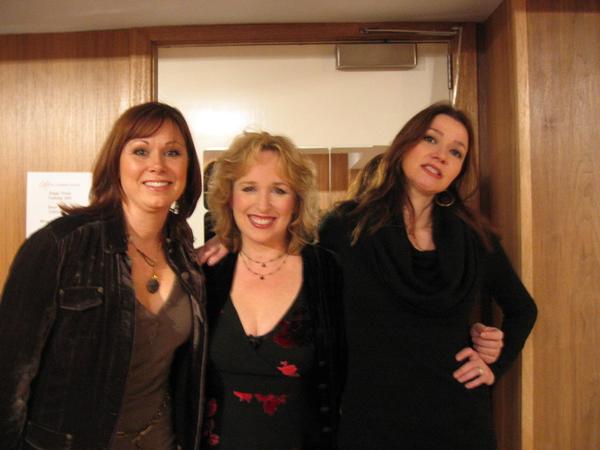
SUZY BOGGUSS, GRETCHEN AND MATRACA BERG
Suzy writes -
"I was talking with Matraca before one of the shows and she said in
her self- deprecating way ' Well, I haven't sold as many CDs as you
have...' and I thought and then said ' Excuse meeeee. With all the songs
you have 'gifted' to other female singers and the albums they've sold, you
probably rival Paul McCartney.' I mean, just think of it that way.
Gretchen and Matraca have had to have sold at least 50 million CDs!
Shout out! Ahem!" |
Where are you at, in your heart of hearts,
with your career at this time? You have had success and established your
brand. Do you feel you still have mountains to climb? Or do you now
approach it more as an established professional, with less focus on
passion and greater focus on execution?
I look back on my career now, and I think it's
amazing that I am really right where I am supposed to be. When you envision your
career as a young artist, you think you know approximately how it's going to go
and how you're going to get there. Invariably your career path ends up looking
completely different from your vision. But for me, I'm very happy with where I
am.
The mountains I feel I have to climb have much more to do with artistic
aspirations than commercial ones. Truthfully, I never really envisioned myself
as a huge commercial success as an artist - there are so many concessions you
have to make to do that, and I don't think I was made of that stuff. I think I
was always going to be a sort of niche artist, someone who appealed to a certain
kind of music fan, someone who would be best suited to playing intimate venues,
theaters, which is what I'm doing now... and frankly, once you get a little
older and your ego gets out of your way, you realize that it's really a
wonderful place to be. Playing a 500 seat theater full of incredibly attentive,
intelligent listeners vs. playing a shed for 50,000 drunk assholes? You tell me
which is the better gig!
As far as passion vs. execution, I think what I
have learned is how to stay in touch with my passion and use what I've learned
over the years about execution to control that passion. That's really the trick
- to not lose your passion but to learn to direct and focus it. That's the thing
that's so endlessly fascinating about playing music, to me - you have to be in
the moment, feeling the emotional flow of the song; but you simultaneously have
to exert all of the control and professionalism that you've spent years
learning. Both of those are important, both of them count. Your ease of
execution is what allows the audience to relax, to trust you with the song. Your
emotion, your passion is what allows them to believe you.
Was it ever your intent to write songs for
other people - be be a "song smith" - or have you just written
what you wanted to sing?
I never thought I could be a song smith. I never had
any luck sitting down and writing something "for" someone. The only
song I ever actually wrote for someone was "Rock Steady" for Bonnie
Raitt, and to my great shock and surprise, she cut it! But generally speaking, I
never felt that I had any particular talent for writing "to order". I
am only really inspired to write when there's a song in me insisting on being
born. And that's not something you do because your publisher says Faith Hill
needs a new hit.
Do you ever feel satisfied with someone
else's interpretation of your songs?
Definitely. Examples? Patty Loveless' version of
"You Don't Even Know Who I Am". Martina McBride's amazing performance
of "Independence Day". Etta James, she KILLED "Love's Been Rough
On Me". Jimmy LaFave - I'd love any version he sang of any of my songs, and
I've been lucky enough to have two of them recorded by him. Those songs are like
my children, and they have grown up and found their place in the world. As with
your kids, you have to accept that they now have lives of their own. I certainly
don't feel that I am the only one qualified to do my own songs, or even that I
am the best candidate, in some cases.
How has music in your world changed, since
we first met back in Colorado 25-plus years ago? And what musical world do
you most relate to now?
When I was living in Colorado I was just a ball
of desire and ambition. Not that I wanted outright commercial success as much as
I wanted respect from my peers, and the chance to be a fish in the "big
pond". I was nineteen, twenty years old, and I wanted to do this music
thing as a professional - to be respected as someone who really had talent and
ability. The funny thing is, I was living in Boulder where there was a very
relaxed and informal atmosphere about the music, and although that influenced
me, it wasn't until years and years later that I could really see the merit in
it. I was so intent on "getting somewhere", getting a record deal or
whatever, that I put all my energy into that. I think it was necessary,
absolutely - but from my perspective now I see the beauty in playing music
simply for the joy of it.
I think when you're young you want success without
really knowing what it is. Success to me, now, means simply being happy doing
what I'm doing. Of course, I have been lucky enough to have had my share of
commercial success, so maybe that's easy for me to say.
The musical world
I am in now, and the one that's most comfortable for me is the DIY/folk world.
These are people who I can relate to, who love the same kinds of music I do, who
place a premium on great lyrics, melodies, songs. I guess I've come full circle.
I never, ever felt comfortable in my skin when I had a record label that was
trying to break me as a mainstream country artist. I'm positive that's why it
didn't work. I knew that wasn't who I was, and I think all those guys in the
radio stations whose asses I kissed knew that wasn't who I was, and my label,
somewhere deep down, knew it too.
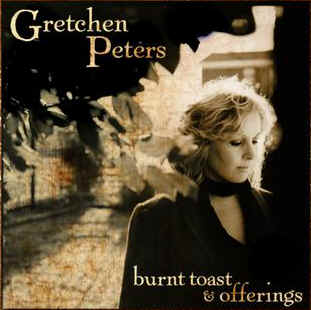 Is there a musical Gretchen Peters within
you that the rest of us haven't seen yet? If so, who is she? Is there a musical Gretchen Peters within
you that the rest of us haven't seen yet? If so, who is she?
I think with every album I make there's a hint of
where I'm going next. Usually one or two songs point the way. I was so focused
on structure, melodically and lyrically, during the first part of my career,
that I feel now I'm trying to unlearn some of it. I was just very intent on
learning structure, on internalizing it. So maybe where I'm going next is to try
to stretch out, to break some of those structural rules, not just musically but
lyrically too.
I purposely went a little farther out on a limb lyrically on Burnt
Toast & Offerings, not to resolve everything, not to explain everything.
In Nashville you learn, by osmosis, to be very clear in your lyrics. I had to
unlearn a little of that. A little ambiguity is what interests me now.
I sadly find that being too experienced in
the mechanics of even a passionate pursuit can take the fun, romance and
magic from it? Do you listen to music anymore to be entertained? If you
do, who do you enjoy?
You know, I went through a very difficult spell when
I thought I had lost my love of music. It was really a period of years. It made
me very sad. Of course, I was in an unhappy marriage with my ex-husband who was
also my manager and producer, and so my business and music and personal life
overlapped to the point of being indistinguishable from one another, and he was
suffering from a pretty extreme case of burnout, too.
I had an epiphany in 2004
- I was on tour in the UK and I had a new iPod but had only really used it at
the gym, things like that - never just for enjoyment. I slipped the earbuds in
the first day of the tour, put on a David Gray album, and suddenly felt more joy
than I had felt in years. Partly it was being on the road again, which I had
missed so much and which gave me so much pleasure, but I was also finding the
joy in music again. It was like I woke up. Just that suddenly, just that clearly
- I realized I needed to get back in touch with that part of myself. From that
day on I vowed I would never let myself get so dragged down that I couldn't find
joy in music - both making it and listening to it. I realized it wasn't music
that I was weary of - it was my life. Music was my savior, I just needed, very
badly, to rearrange other things in my life to make a place for it.
Is Nashville a good home base for you? Are
you surrounded by friends and family? What is it like there? Is the
shopping good?
Nashville is funny. Now that I have moved downtown I
love living here, but when I was living in the suburbs I hated it. I can tell
you all the wonderful things about Nashville - there are more great musicians
per square inch here than anywhere else on earth, people really are incredibly
friendly, you can get to the beach in 8 hours, Memphis is only three hours away,
we have the Ryman Auditorium, we have the only full-scale replica of the
Parthenon in the world, we have some beautiful old architecture (we do have a
tendency to tear it down, but we're getting better), we have great city parks,
the South is full of character and history, it doesn't get too cold here in the
winter - I could go on and on. And by the same token there are things that drive
me stark raving mad - living in the "buckle of the Bible belt", for
one. Sometimes reading the letters to the editor in the local paper is too much
for me. The shopping isn't great, but that's OK because I travel a lot and I get
my shopping fix in London or New York or wherever. And I'm not really that big a
shopper - I enjoy a day of indulging my inner consumer but then I'm done. But
after 20 years here, I have lots of friends, and I am living in a 150 year old
house with a man I love and a big black Labrador, and life is just about as good
as it can be. So I'll put up with the letters to the editor and the mediocre
shopping...
Do you have "extra-musical"
interests? Other creative outlets? How do you enjoy spending your free
time?
Truthfully I don't have a lot of free time,
especially now that I am taking care of my own business, have my own record
label and all of the work that goes along with that - it's like I have three
jobs. But when I'm not working, I'm hanging out with friends, I'm going to the
dog park - there's a whole subculture at the dog park! - or I'm reading, or
playing bridge (it's not just for your grandma anymore!) or traveling for
pleasure - as if I don't get enough of it in my professional life! I am a
lifelong traveler, and even after I stop running around singing I will continue
to travel. I am a bit of a computer geek, too; I have been a Mac person for ages
and I'm always messing around with iTunes, or iMovie, or iPhoto, or whatever. I
love the visual arts and am pretty interested in photography - not technically,
in fact I've resisted learning anything about it from a technical point of view.
But I do love to take photos and I've been told by artists and photographers
that I've worked with that I have a good eye. Maybe they're just flattering me,
but I think I have taken some good photos. I have a creative itch for all things
visual - I get very involved with the design process when I make a new album.
Have you had lifelong friends? Are you
extroverted? Introverted?
I still have the same best friend I had when I was
14. We met in Boulder and went through Boulder High together. She lives in
Nashville now - she sort of followed me here. I would say I'm the type who keeps
my friends. I think I am a strange kind of mixture of extrovert and introvert. I
am extroverted in the sense that I love parties, love to talk to people and love
a house full of people. But I relish my alone-time, too.
I have an inner core
that I think I protect, and it's my creative well. I have always had that; it's
like a well of emotion and it's always there, and I've always been able to tap
into it when I needed to write a song. Writing is a very solitary pursuit, and
you need to protect and nurture your inner life in order to do it.
Do you have a family?
I have all the kinds of family you can have. A lot
of my family is still in Boulder - my mom and two sisters. My brother is on the
East coast. My daughter lives in Washington State. And that's my blood-family. I
also live with someone, we aren't married but I certainly consider him and his
family my family. And then there are my long-time friends; some of them for over
30 years. They're family too. We've gone through Christmases and Thanksgivings
and marriages and births and deaths and divorces together - how much more
'family' can you get?
If you could pick your perfect day from a
shelf, what sort of day would it be? What would you do?
It would start with a sleep-in, until at least 10. I
can't seem to do that unless I'm on the road and staying up til 2 or 3AM. Maybe
a walk in the park, then lunch at the Farmer's Market in downtown Nashville.
Definitely a movie - I'm a movie fiend - indie films, foreign films, quirky
films... In my perfect day I don't have to cook, so dinner would be at a
restaurant, with a good bottle of wine and my sweetheart and one or two friends,
maybe. Good conversation and then bed. Nothing really spectacular, but that
would be a great day. Pretty simple stuff.
Tell me about your new album. Is there a
theme? What does it represent for you?
This record is what's commonly known in the music
business as a "divorce record". Sooner or later it seems like every
artist has one. I guess thematically it's about the death of a marriage and the
birth of a love affair, for me they happened at the same time. Lots of drama in
that.
There are some unabashedly straightforward love songs, but there are some
painful songs about loss and separation and alienation, too. It's by far the
most truthful and autobiographical thing I've ever done. It was hard work, and
it was intensely gratifying. People told me I was brave to be so honest in these
songs, but I really couldn't imagine any other way of doing it. And it was
cathartic, and it was... inevitable. I mean, what else was I gonna write about?
You go through life with a relatively uneventful personal life, at least from
the outside it looked that way... I was married for 23 years, there was no
evident drama; it looked pretty boring. My songs up until this point were
written about other people - people who had elements of my own personality, my
own characteristics, my own desires and fears and longings - but always in the
third person, or fictionalized. This time I was determined to dig deeper, face
down the truth, be honest - I felt I really had a story to tell. It really
represents a breakthrough for me in many ways. It's the first record I made
without my ex-husband, who, when we first married, assumed a sort of
mentor/teacher role for me. He was older, he was more experienced in the studio,
and I was eager to learn everything I could learn. I was 22 when I met him. Of
course, that sort of relationship has to change over time - the student must
graduate, go on and do things on his or her own. Somehow we got stuck and
couldn't get past that. There were a lot of reasons, most of which which are
personal, but bottom line - I needed to spread my wings. That's also what this
album represents, among other things.
|
Why was it released first in the U.K.? I
assume the U.K. tour was timed to support the release?
I have had a long and fruitful touring career in the
UK. I am eternally grateful to UK audiences, and the BBC, and certain media
people in the UK who noticed what I was doing early on. When I was in the throes
of an ill-fated record deal here in the US, and watching my singles die at
country radio, over there my first record was named by Mojo as one of the best
records of the year, and I was being courted by agents, asked to tour, etc. I
don't exactly know why, but I was a perfect fit for the UK market. They don't
tend to go for the cowboy hat artists so much as the singer-songwriters. In the
UK Steve Earle is bigger than Alan Jackson. Nanci Griffith is bigger than
Martina McBride. It's that sort of market. I just fit in perfectly. So I've been
on a label in the UK ever since (although I've changed labels a couple of
times), and I do them the favor of releasing over there first. It gives them a
head start, it prevents their much smaller market (about a tenth of the size of
the US) from being cannibalized by import sales, and I just think it's right and
fitting. The Wine, Women & Song tour was sort of timed according to the Burnt
Toast & Offerings release, but I am doing a solo UK tour (with a band)
for the album in September 2007.
|
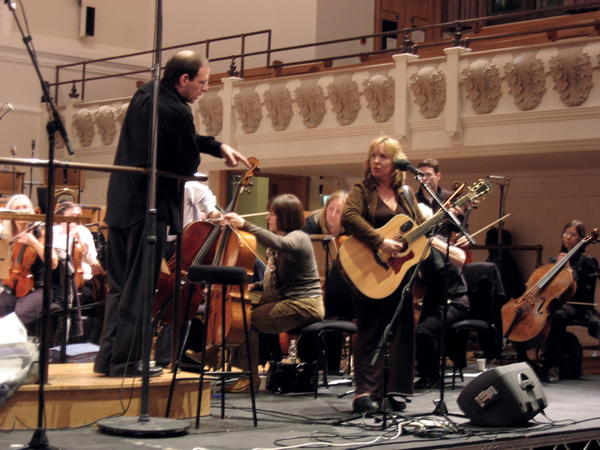
Gretchen Peters in rehearsal with the
BBC Orchestra in London, 2006 |
Do you find that U.K. audiences
"behold" you, and other "American country"
entertainers, in a way far different from the way you are received
"at home?" How does that feel as a performer?
One thing I noticed is that I have more male fans
over there and more female ones over here! I don't have any idea what that's
about. I think the main thing, though, is that I am regarded as primarily a
songwriter here - and between my US booking agent and myself we're trying to
change that - and in the UK I'm thought of as a singer-songwriter.
Those
audiences are very knowledgeable about music, perhaps because they haven't been
force-fed as much music as we have. Commercial radio is still very new in the UK
and the BBC still rules; therefore music fans there are much more proactive in
seeking out music they love, because they have to go looking for it. That
creates a very knowledgeable and motivated core of fans, and a strong
word-of-mouth factor. It also gives the press more weight - critical acclaim
still means something over there. In the US you can have incredible reviews -
I've got boxes of them - and no discernible effect on record sales.
Are you haunted by anything? A song you've
always wanted to write but can't quite? An idea or urge that won't go
away? A fear of anything you can't overcome? Ghosts?
I'm very happy these days. And happily, it hasn't
diminished my need to write, or dampened my creative urge, as some people claim
it can. I don't think you need to be unhappy to write. I think you just need to
be able to tap into your emotional well, which includes sorrow and joy and anger
and all of the emotions. That requires being open - being happy or sad is beside
the point. I guess if anything haunts me it's losing touch with that creativity.
I don't think I will though - I've been this way all my life and although I've
had dark moments of the soul when I thought I had nothing else to say, they
always precede spontaneous bursts of creativity. I've learned to wait.
My fears are mostly silly physical fears - like
roller coasters, heights - things like that. I'm very brave in many ways, but I
won't get on a roller coaster!
Any soapbox issues for you these days?
Anything you feel strongly about and would like to say?
In terms of issues, I think I have the same feeling
that a great majority of my fellow musicians and artists have right now, which
is horror and disgust at what we're doing in Iraq. And the greater question,
which is about America's place in the world, and how much damage has been done
by this reckless and dangerous man in the White House. Musicians and songwriters
have, for centuries, been on the frontlines in terms of commenting on political
issues and framing them in ways such that 'regular' people can understand how
their lives are affected. We are the modern-day troubadours, and troubadours
have always provided not just entertainment, but social commentary. In the
middle ages the troubadours literally spread the news from town to town, and
their songs were not just about romantic love but the political issues of the
day.
What happened to the Dixie Chicks was inexcusable in a country that
purports to defend free speech. Absolutely inexcusable. And much of it was
promoted by the media, who love a good dogfight because it sells
papers/ads/subscriptions.
I really lay a lot of the blame at the media's feet.
My father was a journalist and TV documentary producer at CBS News during the
60's, and at that time the news department was sacrosanct. There was a strong
sense of ethics and a feeling that being a journalist was a responsibility. I
think that's all but gone today. Most radio and TV personalities, and their
bosses, are more concerned with ratings. And all of that brings about questions
about media deregulation, corporatization, and whether there really even is a
free press anymore. When I tour in the UK I am stunned at the difference in the
news reporting about the war. Those people are really getting the news. They're
seeing the caskets, the amputees, the orphaned children. We aren't.
GO TO:
ARTIST NEWS
•
YOU
ARE ON A SPECIAL FEATURES PAGE
|
 |
|
©Rick
Alan Rice (RAR),
October, 2011
|
|